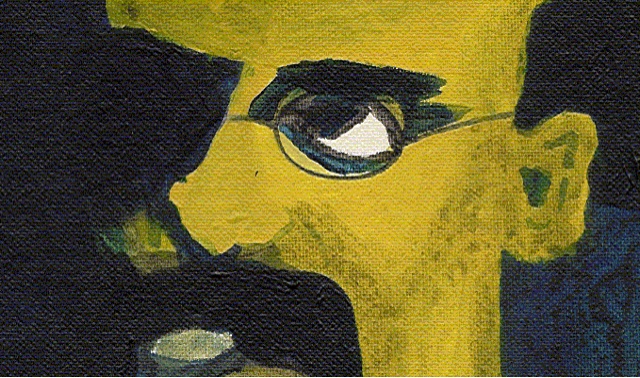Decided I would re-read Nietzsche's Birth Of Tragedy after sitting in one of our Theorizing classes and getting really angry about the reductionism of art to symbols. It all felt very scientific and Appolonian to me, so on my next bookstore trip I grabbed a copy. What really struck me with this read (the first time read not in relation to trying to write a paper) was the poetry of Nietzsche's language, the beauty of his text. And maybe it is because I now know the ending (I have read most of the rest of his work, including The Twilight of the Idols which re-thinks this text) but I could feel the argument leaning more toward the Dionysian than the Appolonian, though on the whole arguing for a balance.
I have to agree with this argument after sitting through classes on semiotics.....I feel like as soon as we reduce so much to only appearances and imbue meaning that way, we have lost the flow, the "Music" as Nietzsche puts it.
- art is the highest task and the proper metaphysical activity of this life (Wagner - foreword)
- mysterious union, after many long and precursory struggles, found glorious consummation in this child, - at once Antigone and Cassandra. (p13)
- only in so far as the genius in the act of artistic creation coalesces with this primordial artist of the world, does he catch sight of the eternal essence of art; for in this state he is, in a margelous manner, like the weird picture of the fairy-tale which can turn its eyes at will and behold itself; he is now at once subject and object, at once poet, actor and spectator. (p17)
- the true spectator, whoever he may be, must always remain conscious that he was viewing a work of art, and not an empirical reality. (p21)
- they have perceived, but it is irksome for them to act; for their actions cannot change the eternal nature of things (p23)
- nearly every age and stage of culture has at some time or other sought with deep irritation to free itself from the Greeks, because in their presence everything self-achieved, sincerely admired and apparently quite original, seemed suddenly to lose life and colour, to shrink to an abortive copy, even to caricature. (p52)
- In spite of fear and pity, we are the happy living beings, not as individual, but as the one living being, with whose creative joy we are united. (p60)
- and when were we in greater need of these highest of all teachers more than at present, when we are experiencing a rebirth of tragedy and are in danger alike of not knowing whence it comes and of being unable to make clear to ourselves whither it tends? (p73)
- however powerfully we are touched by fellow-suffering, it nevertheless delivers us in a manner from the primordial suffering of the world, just as the symbol-image of the myth delivers us from the immediate perception of the highest world-effusion of the unconscious will. (p79)
I am reminded that Nietzche's account is of the historical birth of tragedy, but the rebirth, after empirical objectivity killed tragedy through Socratism. Tragedy was ended by this, but must be re-born, as it is the other half of our understanding and experience as humans.
I have to agree with this argument after sitting through classes on semiotics.....I feel like as soon as we reduce so much to only appearances and imbue meaning that way, we have lost the flow, the "Music" as Nietzsche puts it.
- art is the highest task and the proper metaphysical activity of this life (Wagner - foreword)
- mysterious union, after many long and precursory struggles, found glorious consummation in this child, - at once Antigone and Cassandra. (p13)
- only in so far as the genius in the act of artistic creation coalesces with this primordial artist of the world, does he catch sight of the eternal essence of art; for in this state he is, in a margelous manner, like the weird picture of the fairy-tale which can turn its eyes at will and behold itself; he is now at once subject and object, at once poet, actor and spectator. (p17)
- the true spectator, whoever he may be, must always remain conscious that he was viewing a work of art, and not an empirical reality. (p21)
- they have perceived, but it is irksome for them to act; for their actions cannot change the eternal nature of things (p23)
- nearly every age and stage of culture has at some time or other sought with deep irritation to free itself from the Greeks, because in their presence everything self-achieved, sincerely admired and apparently quite original, seemed suddenly to lose life and colour, to shrink to an abortive copy, even to caricature. (p52)
- In spite of fear and pity, we are the happy living beings, not as individual, but as the one living being, with whose creative joy we are united. (p60)
- and when were we in greater need of these highest of all teachers more than at present, when we are experiencing a rebirth of tragedy and are in danger alike of not knowing whence it comes and of being unable to make clear to ourselves whither it tends? (p73)
- however powerfully we are touched by fellow-suffering, it nevertheless delivers us in a manner from the primordial suffering of the world, just as the symbol-image of the myth delivers us from the immediate perception of the highest world-effusion of the unconscious will. (p79)
I am reminded that Nietzche's account is of the historical birth of tragedy, but the rebirth, after empirical objectivity killed tragedy through Socratism. Tragedy was ended by this, but must be re-born, as it is the other half of our understanding and experience as humans.

